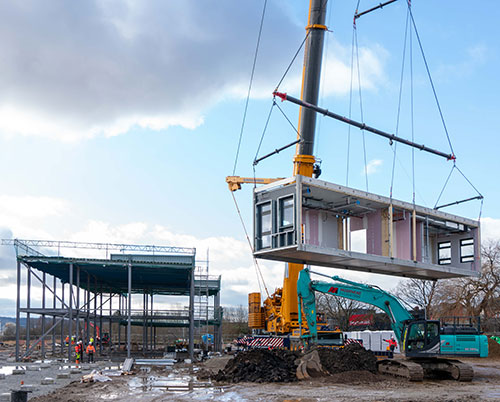Portakabin completes installation in just 19 days for a new state-of-the-art, 200-place special educational needs school in Leeds.
Portakabin, the UK’s market leader in modular construction, successfully installed a 70-module complex at the Cross Green Road site in Leeds earlier this year, with installation complete in under three weeks.
Following a successful bid to the Department for Education in 2019, Leeds City Council announced Co-op Academies Trust as the successful sponsor of the special educational needs free school. The DfE selected modular specialist, Portakabin, to deliver this project.
The school opened in temporary accommodation at another Co-op Academy Trust site, on time and welcomed 56 children in September 2022. The new building will welcome the second cohort of students, an additional 86 children in September 2024. Full capacity of 200 is expected to be reached the following year.
Portakabin precision-engineered the modules, that were designed specifically for Co-op Academies Trust project, at its manufacturing facility in York and transported them less than 35 miles away to the site in Leeds. Known as ‘Co-op Academy Brierley’, the new SEND school will host 200 students from the ages of 4-16 in Leeds. The school is set to have a primary and secondary provision and will become an essential part of the local community in East Leeds.
Constructed off site using Modern Methods of Construction (MMC), the school was installed quickly and safely despite having to manage around periods of high wind, with all custom-built modules on-site in less than three weeks.
James Pearson, Divisional MD at Portakabin said:
“Co-op Academy Brierley is one of the projects awarded to us on the DfE’s MMC framework. Despite the inclement weather, we were able to successfully deliver and install 70 modules safely in just 19 days, maintaining the agreed contract programme.
Particular attention has been paid to preserving existing trees on site, despite the need for extensive sculpting of levels on the site, to achieve the gradients required for compliant access.
It’s a great pleasure to celebrate the first milestone in this project, which will become an important part of the local community.”
Alongside over 27 classrooms and dedicated teaching space, the completed school will boast extensive minibus drop-off facilities, approximately 130 car parking spaces for staff and visitors, an immersive technology room, therapy, and sensory rooms.
After starting on site in January, installation was completed on 18 February, with the project set to be handed over before the start of the new school year in September 2024.

Tim Leach, Contract Manager at Portakabin alongside Sarah Harridge, Headteacher at Co-op Academy Brierley
Sarah Harridge, Headteacher said:
“The pace that our new school was built was nothing short of spectacular, this new school will give children with special needs in Leeds a state of the art, custom built provision with their needs at the heart of every decision made in the build process.”
Vicki England, Co-op Academy Project Manager said:
“This project has been very smooth and has remained on budget throughout which is of course very important when we’re working with Department for Education budgets, the school looks fantastic so far and we look forward to welcoming all 142 children to their new facility in September.”
The planned opening date for Co-op Academy Brierley is September 2024.
CLICK HERE FOR FURTHER INFORMATION
CLICK HERE TO VISIT THE PORTAKABIN WEBSITE






